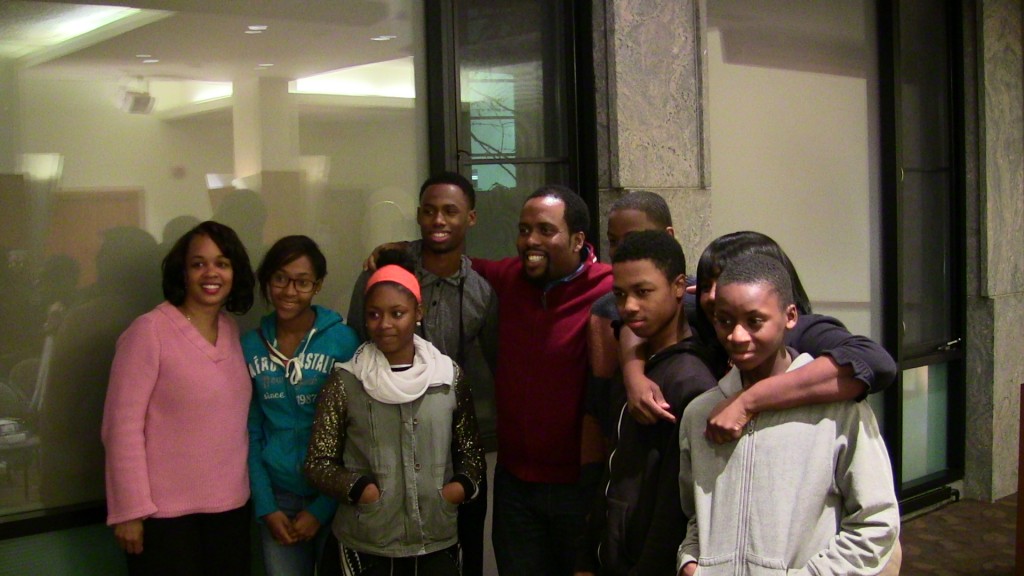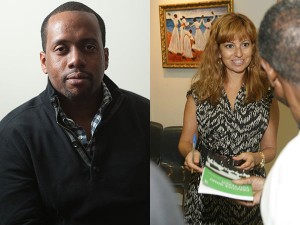TeacherLives
As a new faculty member in the Department of Educational Studies at Swarthmore College, Professor Edwin Mayorga design and implemented a new course in our department for the Fall 2014 semester.
Education 43: Teacher Narratives, Policy and Power – “We Answer with our Lives” #TeacherLives
This course is an exploration of the lives of teachers, how they are framed within popular culture and policy, and how they frame themselves within the politics of the classroom, schools and broader society. While our analysis is situated in a national/global discussion, the focus will be on teachers in U.S. urban settings. Students will be working with various critical social theories and analytical tools to think through teacher narratives, historical and sociological texts, film, policy debates, guest presentations, and other sources. Assignments will include conducting interviews with educators and producing mixed media projects that deepen our collective understanding of teacher lives/identities and interrupt dominant and often reductive discourses about educators.
#TeacherLives on Twitter
I invite interested individuals to follow course conversations with students through Twitter at #TeacherLives
#TeacherLives Speaker Series
We will also be hosting a speaker series on #TeacherLives which will include talks by educator-scholar-activists Dr. Bree Picower and Jose Luis Vilson
Course Goals/Big Ideas
- Coming to know #TeacherLives informs our understanding of broader ideologies, social relationships, and structural inequities and cultural differences
- #Teacherlives are situated within the gendered cultural political economy
- Teacher working conditions are their students learning conditions
- Working/learning conditions are mediated by policies and institutional structures
- There are various discourses that frame teachers and their lives, and these discourses are articulated in media, research, governance, and policy making.
- Teachers have a voice in the classroom, in community, and in policy that is often ignored or misunderstood
- Oral history, interviewing, and portraiture are effective qualitative research methods for documenting #teacherlives
Required Books (All are available at Bookstore and EMC)
- Picower, B. (2012). Practice What You Teach: Social Justice Education in the Classroom and the Streets. New York: Routledge.
- Vilson, J. (2014). This Is Not A Test: A New Narrative on Race, Class, and Education. S.l.: Haymarket Books.
- Weber, S. J., & Mitchell, C. (1995). That’s Funny You Don’t Look Like A Teacher!: Interrogating Images, Identity, And Popular Culture. London ; Washington, D.C: Routledge.
Teacher-authored books
- Garon, I. (2013). Why Do Only White People Get Abducted by Aliens?: Teaching Lessons from the Bronx (1 edition.). New York: Skyhorse Publishing.
- Kaufman, B. (2012). Up the Down Staircase. Harper Collins
- Paley, V. G. (2000). White Teacher. Cambridge, Mass: Harvard University Press.
Recommended (Excerpts will be used in class)
- Achinstein, B., & Ogawa, R. T. (2011). Change(d) Agents: New Teachers of Color in Urban Schools. New York: Teachers College Press.
- Ayers, W. (2010). To Teach: The Journey, in Comics. New York: Teachers College Press.
- Casey, K. (1993). I Answer With My Life: Life Histories of Women Teachers Working for Social Change. New York: Routledge. (Out of Print)
- Endo, H., & Chamness Miller (Eds.). (2013). Queer Voices from the Classroom. Charlotte, North Carolina: Information Age Publishing.
- Goldstein, D. (2014). The Teacher Wars: A History of America’s Most Embattled Profession. New York: Doubleday.
- Green, E. (2014). Building a Better Teacher: How Teaching Works. W. W. Norton & Company.
- Ingersoll, R. M. (2003). Who Controls Teachers’ Work?: Power and Accountability in America’s Schools.
Harvard University Press
- Jacobin. (2014). Class Action: An Activist Teacher’s Handbook. Retrieved from https://www.jacobinmag.com/2014/02/class-action-an-activist-teachers-handbook/
- Kumashiro, K. K. (2013). Bad Teacher! How Blaming Teachers Distorts the Bigger Picture. Teachers College Press.
- Leavy, P. (2011). Oral History: Understanding Qualitative Research (1 edition.). Oxford ; New York: Oxford University Press, USA
- Nieto, S. (2003). What Keeps Teachers Going? (3rd edition.). New York: Teachers College Press.
- Ochoa, G. (2007). Learning from Latino Teachers (1 edition.). San Francisco, CA: Jossey-Bass.
- Rensenbrink, C. W. (2001). All in Our Places (First Edition). Lanham, Md: Rowman & Littlefield Publishers.
- Riessman, C. K. (2007). Narrative Methods for the Human Sciences. London: SAGE Publications, Inc.
- Rousmaniere, K. (1997). City Teachers: Teaching and School Reform in Historical Perspective. New York: Teachers College Press.
Articles List
- Lorde, A. (2001). Chapter 11: The transformation of silence into language and action. In B. Ryan (Ed.), Identity politics in the women’s movement (pp. 81–83). New York: New York University Press.
- Phelps, C. (2014, February 24). The Tyee – Trayvon’s Legacy: How Diversity Hides Racism. The Tyee. http://thetyee.ca/Opinion/2014/02/24/Trayvon-Legacy/
- Rizzolo, A., & Behrstock-sherratt, E. (2013, August 16). How to Boost Teacher Voice in Policy. Education Week. http://www.edweek.org/ew/articles/2013/08/16/01rizzolo.h33.html
- Rust, F., & Meyers, E. (2006). The bright side: teacher research in the context of educational reform and policy‐making. Teachers and Teaching, 12(1), 69–86.
#TeacherLives in Film
Here is a partial list of films that students can view for an analysis of how teachers and teacher lives have been depicted in film over the last 50 years. If you have a film to recommend please share via Twitter, use #TeacherLives
- Ardolino, E. (1992). Sister Act. Comedy, Music.
- Avildsen, J. G. (1989). Lean on Me. Action, Drama.
- Barnz, D. (2012). Won’t Back Down. Drama.
- Bogdanovich, P. (1996). To Sir, with Love II. Drama.
- Cantet, L. (2008). The Class. Drama.
- Clavell, J. (1967). To Sir, with Love. Drama.
- Craven, W. (1999). Music of the Heart. Drama, Music.
- Eyre, R. (2007). Notes on a Scandal. Drama, Thriller.
- Fleck, R. (2006). Half Nelson. Drama.
- Guggenheim, D. (2010). Waiting for “Superman.” Documentary.
- Haines, R. (2006). The Ron Clark Story. Biography, Drama.
- Herek, S. (1996). Mr. Holland’s Opus. Drama, Music.
- Hoffman, M. (2002). The Emperor’s Club. Drama.
- Kasdan, J. (2011). Bad Teacher. Comedy.
- Kaye, T. (2012). Detachment. Drama.
- Leder, M. (2000). Pay It Forward. Drama.
- Lemons, L. R. (N/A). Be My Teacher. Drama, Romance.
- Linklater, R. (2003). School of Rock. Comedy, Music.
- Menéndez, R. (1988). Stand and Deliver. Drama.
- Mulligan, R. (1967). Up the Down Staircase. Drama.
- Olmos, E. J. (2006). Walkout. Drama.
- Payne, A. (1999). Election. Comedy, Drama.
- Reitman, I. (1990). Kindergarten Cop. Action, Comedy, Crime.
- Smith, J. N. (1995). Dangerous Minds. Biography, Drama.
- Washington, D. (2007). The Great Debaters. Biography, Drama.
#TeacherLives in additional media platforms
Chicago Teachers Union President Karen Lewis, Keynote @ NW Teaching for Social Justice Conference. (2011). http://www.youtube.com/watch?v=AUGgJ14mL8o&feature=youtube_gdata_player
Rebel Diaz – Chicago Teacher. (2012).
http://www.youtube.com/watch?v=3yN7cRZP58k&feature=youtube_gdata_player
Questions/Comments
For Edwin Mayorga @eimayorga
For course discussion: #TeacherLives

